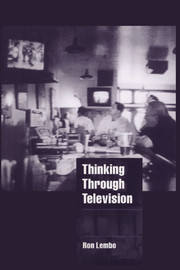Book contents
- Frontmatter
- Contents
- Acknowledgments
- Introduction: Situating my experience with television
- PART I Conceptions of television use
- PART II Reconceptualizing television use
- 4 Sociality and the problem of the subject
- 5 Components of a viewing culture
- PART III Documenting the viewing culture
- Conclusion: The politics of television reconsidered
- References
- Index
4 - Sociality and the problem of the subject
Published online by Cambridge University Press: 22 September 2009
- Frontmatter
- Contents
- Acknowledgments
- Introduction: Situating my experience with television
- PART I Conceptions of television use
- PART II Reconceptualizing television use
- 4 Sociality and the problem of the subject
- 5 Components of a viewing culture
- PART III Documenting the viewing culture
- Conclusion: The politics of television reconsidered
- References
- Index
Summary
In the course of my critique – of social theory, social science, and cultural studies – I pointed to limitations, absences, to significant gaps and ambiguities in the ways that the culture of television use, and media use more generally, was understood. I argued there that cultural studies is the most sophisticated of contemporary approaches to the study of television use. It allows analysts to conceptualize multiple dimensions of social power inscribed in the object, television, and to account for how this power actually works in the everyday lives of people, too. For these reasons alone, cultural studies constitutes the cutting edge of television research and media research more generally.
But, more than that, cultural studies has challenged conventional wisdom when it comes to thinking about things social and cultural. Time and again, cultural studies' analysts have refused to conceptualize subjectivity, social life, or cultural practice as distinct from power or from the workings of discourse more generally. Analytical accounts of television or other media that identify discursive regularities highlight the fact that cultures of viewing are always already implicated in power. Similarly, accounts that focus on textual reading strategies indicate very clearly that people are indeed agents in meaning–making processes, but in ways that legitimate, negotiate, and resist various power effects. And the very construct of discursive practice names the ways in which the workings of discourse and power have become coincident with the social experience of people, sometimes in very subtle ways.
- Type
- Chapter
- Information
- Thinking through Television , pp. 85 - 98Publisher: Cambridge University PressPrint publication year: 2000



